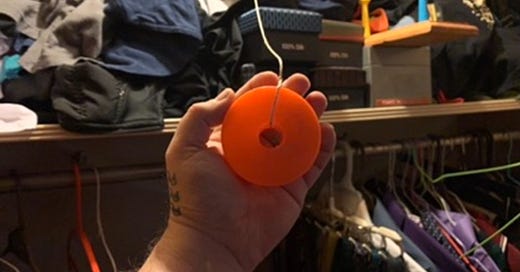The Donut and the Dark
My mother’s gift of light, it turned out, could illuminate even the darkest places.
WHEN I WAS ABOUT 3, I was afraid of the dark in my room at night. My mother came up with an elegant solution.
She went to my early 1970s toy pile and extracted a plastic Fisher-Price "donut” — a thick, bright-orange disc with a hole in the middle, designed for a child’s hand. She ran a string from the pull-on, pull-off light switch in my closet all the way down to a toddler's level and tied the donut to the end of it. She showed me how to get up out of bed, pad over and turn it on when I felt afraid.
"Now," she said, "you control the light."
Years passed. The string migrated upward, diligently and gradually, snip by snip. She made certain of that.
By the time my freshman year of college was at hand, the donut hung at eye level of the 6-foot man I had become.
A few days before I left my childhood behind and moved to Penn State and onward to my life beyond, I closed myself in my bedroom and spent several minutes tugging at the donut. The closet bulb went on, off, on, off, on.
At that moment, I felt like I controlled very little. But I still controlled the light.
I LEFT FOR 20 YEARS. I went all the way around the world. War zones, distant Chinese villages, sites of plane crashes and mass shootings. But I was always drawn back to visit. And the donut remained. After 9/11, when I was sent to Afghanistan and Iraq as a journalist, the donut hung in the back of my mind, a mental talisman of comfort and safety. If I could reach it again, surely I would be OK. I did, and I was.
In 2007, my parents left the house they had built so long ago and moved into a retirement community. We relocated back to Pittsburgh to be near them, and we moved into the house. My oldest son, then 4, got my old room. My mother made sure to re-extend the string before she left. Someone shorter needed to control the light again.
My parents faded, as parents do. Alzheimer's took my father and took its cruel, methodical time. Then dementia encircled my mother.
Just before Thanksgiving 2018, she began her final decline. You know the story. From walker to wheelchair, wheelchair to bed. Confusion. Sadness. Bewilderment. "I'm just stuck," she lamented to me. "I don't control anything anymore."
I spent much of her morphine-induced final days sleeping on the floor next to her, feeding her orange sherbet and sips of Barefoot Cabernet from single-serving bottles. At night, I sang to her quietly some of the songs we’d listened to on AM radio together when I was a boy. I sang Paul Simon’s “Slip Sliding Away,” one of our favorites, now fraught with searing new meaning. When I got to Billy Joel’s “I Love You Just The Way You Are,” she summoned enough energy to rasp: “That’s how I feel about you.”
On her final morning of consciousness, I woke up on the floor and saw her hand reaching toward me over what was going to be her deathbed. “Are you still there?” she whispered. She couldn’t sit up far enough to check on her own.
“I’m here,” I said. “Are you?
She responded: “I think so.”
MY MOTHER DIED just hours into December. Two days later, I took a scissors from the kitchen drawer of our house and went into my now-15-year-old son's room. I opened the closet door. With him watching, I reached up and snipped the string. For the first time since Nixon's first term, the orange donut was absent from the closet where it had hung for so long.
The following morning, at the funeral home, we spent some time with my mother before our final goodbye. My younger son placed a baseball next to her, signed in his just-emerging cursive. Then, carefully, I laid the donut by her side. Gently, touching her for the last time, I threaded the string through the fingers of her right hand before they closed the casket.
It made so much sense. Our roles, so many years later, were now reversed. At long last, she had become the one who needed to control the light.
A version of this story first appeared in the PennStater magazine in 2019.









Wow. One of your best, Ted — big kudos.
As you can imagine, the object-based focus of this story really speaks to me. If you're willing, I'd love to cross-publish this as a guest entry on Inconspicuous Consumption. No pressure, of course — if you'd rather not, that's fine. But if you like that idea, let's talk.
A story worth sharing, told perfectly. Wonderful writing.